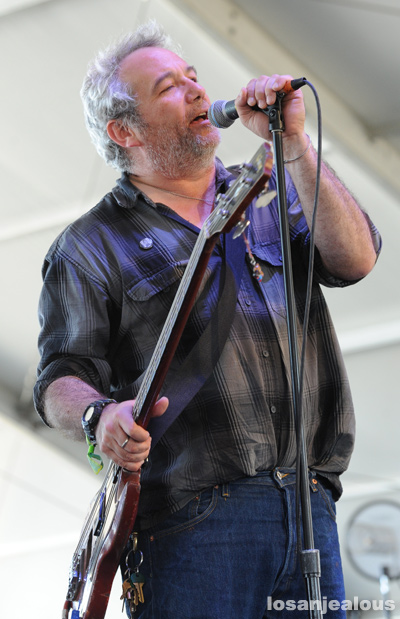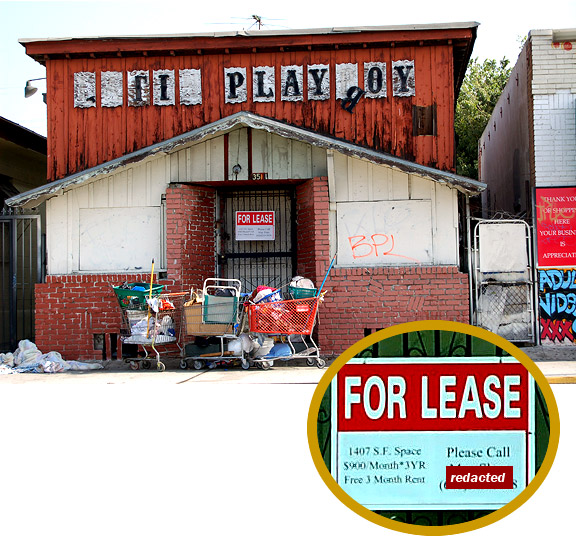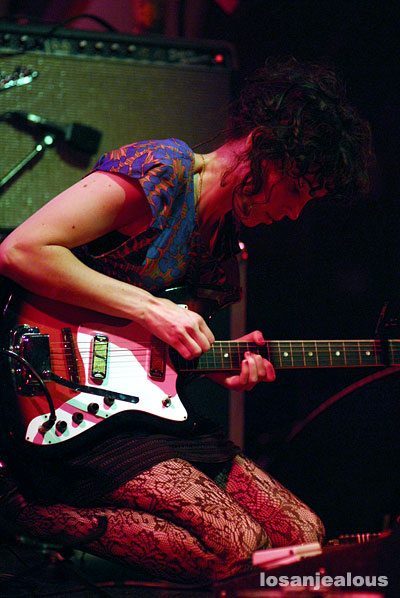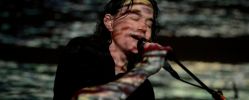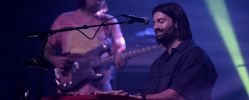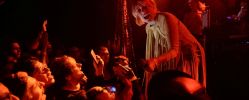Love Story, Out Now On DVD
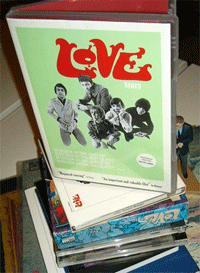 Following a mid-90’s-early-00’s resurgence in popular interest in Love—a period that more or less bittersweetly corresponds to main man Arthur Lee’s imprisonment—the band’s rightful resting place in the upper echelons rock’s pantheon grows more secure day by day. Since then, output by, about and inspired by the man and the band has been issued at a steady trickle, be it from critics (A MOJO Heroes volume dedicated to Lee; the 33 1/3 series take on Forever Changes ); record label vaults (Rhino’s Love Story anthology, followed by two CD reissues of Forever Changes, including a remastered edition just this year); homage from the indie rock world (Belle & Sebastian, Mazzy Star, The Make-Up, The Raconteurs); and band members themselves (Michael Stuart-Ware’s 2003 engaging memoir of his time in Love, Behind the Scenes: On the Pegasus Carousel with the Legendary Rock Group Love). To the trove, finally, we can add some much desired moving pictures: Love Story, a 2006 U.K-produced documentary arrives now on DVD.
Following a mid-90’s-early-00’s resurgence in popular interest in Love—a period that more or less bittersweetly corresponds to main man Arthur Lee’s imprisonment—the band’s rightful resting place in the upper echelons rock’s pantheon grows more secure day by day. Since then, output by, about and inspired by the man and the band has been issued at a steady trickle, be it from critics (A MOJO Heroes volume dedicated to Lee; the 33 1/3 series take on Forever Changes ); record label vaults (Rhino’s Love Story anthology, followed by two CD reissues of Forever Changes, including a remastered edition just this year); homage from the indie rock world (Belle & Sebastian, Mazzy Star, The Make-Up, The Raconteurs); and band members themselves (Michael Stuart-Ware’s 2003 engaging memoir of his time in Love, Behind the Scenes: On the Pegasus Carousel with the Legendary Rock Group Love). To the trove, finally, we can add some much desired moving pictures: Love Story, a 2006 U.K-produced documentary arrives now on DVD.
Spiralling out from a couple of exclusive video interviews with Arthur, his last ever, the film has recollections from band members Johnny Echols, “Snoopy” (Alban Pfisterer–whom, apparently features in the DVD bonus material) and Bryan Maclean (from an earlier source, as he died in 1998), as well as affiliated key players from the era (John Densmore, Jac Holzman, Bruce Botnick, etc), a smattering of cameo clips from the U.K. (Ken Livingston, Mani, Bobby Gillespie, Stephen Pound [MP, House of Parliament–particularly amusing]) woven together with archival footage and still photos, both familiar and newly unearthed. It moves fast, to trace Arthur’s path from Memphis to LA to Dorsey High, to get to the commonly considered “classic” era of Love that ran from their eponymous debut through Forever Changes.
The chats with Arthur, apparently filmed circa 2005 (the absence of date and source titles on the various footage is a minor gripe), stick mostly to the familiar points of the history on the band that will be familiar to anyone who has read any of the liner notes, but still it’s great to get anecdotes retold by the man. Trainspotters will amused by the occasional tidbit, such as what the title of “7 And 7 Is” refers to. The mandatory Narrated Drive Through The Old Neighborhood is dutifully included, Arthur pointing out the spot in the Dorsey High gate where, as legend has it—and Arthur is all too glad to reaffirm—he snuck out one day to walk to Capitol Records in search of a record contract.
Lead guitarist Johnny Echols is the most lucid of the bunch, full of sharp recollections, altogether engaging and reliable, coming across as the co-star of the film. One wishes that the filmmakers could have brought Arthur and Johnny together in the same room for some shared reminiscences. (The two were reconciled and Johnny appeared on guitar for some of the 2003 Forever Changes shows.) A present day tour with Johnny of the Hollywood brick warehouse space at Cosmo & Selma that used to be Bido Lito’s, the rock club from where Love ruled the town, is a fun moment. “The stage was over here…” type of recollections.
Some priceless moments are captured, such as Arthur taking the camera through a present-day tour of The Castle, the fabled Los Feliz mansion that the band famously occupied as a collective in their heyday, now some 30 years after he called it home. (Presently maintained in tacky gilded gaudy decor by it’s current owners.) When he crosses a hall, points and says “This was Bryan’s room,” it is hard to not feel wistful. There is something of a big brother’s loving kidding in Arthur as he mocks for our benefit Bryan’s decoration of his room back then. Another, great little moment is Arthur uncharacteristically dropping his ego to admit that it was fear that kept him from venturing out of Los Angeles to tour, the oft cited knock on them. Jac Holzman brings up this fact that they did not tour as a big factor in their demise. (The Four Sail lineup did, in fact, go to Europe in 1970 and some footage from a Copenhagen performance is included here.)
One wonders what an interviewer’s occasional inquiring voice might have been able to draw out Arthur and maybe attempt to get deeper with him (not that Arthur would have played ball with anything less than a fawning over him). Thus it’s both gratifying and frustrating to know these are the final interviews with Arthur; so many more questions to ask. The long mentioned autobiography (apparently meant to be titled Rainbow In The Storm: The Book of Love Part I, as Arthur amusingly blatantly plugged it in the foreward he wrote to Riot On Sunset Strip) does not seem to be moving any closer to reality, posthumously.
For better or worse, the film mostly maintains distance and objectivity and skips past any direct commentary and critical interpretations, allowing Arthur and other interviewees to take their and observations where they want. There is some attempt to place the Love in the broader context of the 60s as a product of times. This is a satisfying overview of the broad strokes of the Love story, but there is still room to delve deeper and take strands of the tale farther.
Just recently, LA Weekly heaped fresh encomium on the band, restating the solid case for them as not just one of, but in fact the all time great band of LA. Always appreciated, if only to knock down our overrated bands that tend to glut up the all time LA list–Eagles, Doors, Janes, Chili Peppers–a few pegs. Love Story is an admirable effort to pull together disparate bits and pieces of their history. It is an essential document, but let’s hope it’s not the last Love story and that more Love stories are still to be told.
 Love Story
Love Story
2008, Dir. Chris Hall & Mike Kerry
Start Productions
BUY
